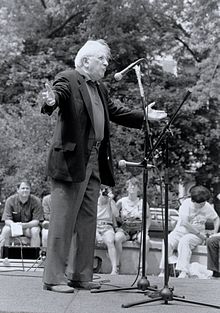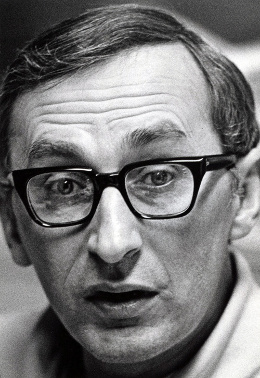
Michael Royko Jr. was an American newspaper columnist from Chicago. Over his 30-year career, he wrote over 7,500 daily columns for the Chicago Daily News, the Chicago Sun-Times, and the Chicago Tribune. A humorist who focused on life in Chicago, he was the winner of the 1972 Pulitzer Prize for commentary.

The Chicago Sun-Times is a daily nonprofit newspaper published in Chicago, Illinois, United States. Since 2022, it is the flagship paper of the non-profit Chicago Public Media, and has long held the second largest circulation among Chicago newspapers, after the Chicago Tribune. The Sun-Times resulted from the 1948 merger of the Chicago Sun and the Chicago Daily Times newspapers. Journalists at the paper have received eight Pulitzer Prizes, mostly in the 1970s; one recipient was the first film critic to receive the prize, Roger Ebert (1975), who worked at the paper from 1967 until his death in 2013. Long owned by the Marshall Field family, since the 1980s ownership of the paper has changed hands numerous times, including twice in the late 2010s.

The Newberry Library is an independent research library, specializing in the humanities and located on Washington Square in Chicago, Illinois. It has been free and open to the public since 1887. Its collections encompass a variety of topics related to the history and cultural production of Western Europe and the Americas over the last six centuries. The Library is named to honor the founding bequest from the estate of philanthropist Walter Loomis Newberry. Core collection strengths support research in several subject areas, including maps, travel, and exploration; music from the Renaissance to the early twentieth century; early contact between Western colonizers and Indigenous peoples in the Western Hemisphere; the personal papers of twentieth-century American journalists; the history of printing; and genealogy and local history.

Debate is a process that involves formal discourse, discussion, and oral addresses on a particular topic or collection of topics, often with a moderator and an audience. In a debate, arguments are put forward for common opposing viewpoints. Debates have historically occurred in public meetings, academic institutions, debate halls, coffeehouses, competitions, and legislative assemblies. Debates have also been conducted for educational and recreational purposes, usually associated with educational establishments and debating societies. These debates emphasized logical consistency, factual accuracy, and emotional appeal to an audience. Modern forms of competitive debate also include rules for participants to discuss and decide upon the framework of the debates.

The Cambridge Union Society, also known as the Cambridge Union, is a debating and free speech society in Cambridge, England, and the largest society in the University of Cambridge. The society was founded in 1815 and is the oldest continuously running debating society in the world. Additionally, the Cambridge Union has served as a model for the foundation of similar societies at several other prominent universities, including the Oxford Union and the Yale Political Union. The Union is a private society with membership open to all students of Cambridge University and Anglia Ruskin University. The Cambridge Union is a registered charity and is completely separate from the Cambridge University Students' Union.
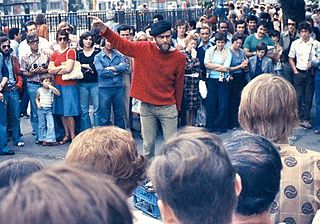
A Speakers' Corner is an area where free speech open-air public speaking, debate, and discussion are allowed. The original and best known is in the north-east corner of Hyde Park in London, England. Historically there were a number of other areas designated as Speakers' Corners in other parks in London, such as Lincoln's Inn Fields, Finsbury Park, Clapham Common, Kennington Park, and Victoria Park. Areas for Speakers' Corners have been established in other countries and elsewhere in the UK.

The National Catholic Forensic League (NCFL) is a speech and debate league that was formed in 1951. It is organized into regions that correspond to Roman Catholic dioceses. Member schools include both public and parochial high schools. The NCFL recruits member schools in both the United States and Canada. As of January, 2011, there were 65 active dioceses with NCFL leagues. The IRS recognizes the NCFL as an organization eligible to receive tax-deductible charitable donations.
The American Parliamentary Debate Association (APDA) is the oldest intercollegiate parliamentary debating association in the United States. APDA sponsors over 50 tournaments a year, all in a parliamentary format, as well as a national championship in late April. It also administers the North American Debating Championship with the Canadian University Society for Intercollegiate Debate (CUSID) every year in January. Although it is mainly funded by its member universities, APDA is an entirely student-run organization.

The Chicago Public Library (CPL) is the public library system that serves the City of Chicago in the U.S. state of Illinois. It consists of 81 locations, including a central library, three regional libraries, and branches distributed throughout the city's 77 Community Areas.

Myron Reed "Slim" Brundage was the "founder and janitor" of the College of Complexes, a radical social center in Chicago during the 1950s. It was known as Chicago's Number One "beatnik bistro".

A soapbox is a raised platform on which one stands to make an impromptu speech, often about a political subject. The term originates from the days when speakers would elevate themselves by standing on a wooden crate originally used for shipment of soap, or other dry goods, from a manufacturer to a retail store.

The Chicago Pride Parade, also colloquially called the Chicago Gay Pride Parade or PRIDE Chicago, is an annual pride parade held on the last Sunday of June in Chicago, Illinois in the United States. It is considered a culmination of the larger Gay and Lesbian Pride Month in Chicago, as promulgated by the Chicago City Council and Mayor of Chicago. Chicago's Pride Parade is one of the largest by attendance in the world. The event takes place outside and celebrates equal rights for lesbian, gay, bisexual, transgender and queer people, which is also known as the celebration of LGBTQ rights.
The College of Complexes is a loose organization committed to free speech, those interested in continuing adult education, and focusing on social issues and current events. The name is derived from "a psychiatric term for repressed ideas that compel expression." The underlying purpose is to solve all the world's problems.
The San Diego free speech fight in San Diego, California, in 1912 was one of the most famous class conflicts over the free speech rights of labor unions. Starting out as one of several direct actions known as free speech fights carried out across North America by the Industrial Workers of the World, the catalyst of the San Diego free speech fight was the passing of Ordinance No. 4623 that banned all kinds of speech in an area that included "soapbox row" downtown. Clashes with the police in the area led to riots, multiple deaths including the deaths of police officers, as well as the retaliatory kidnapping and torture of notable Socialists, including Emma Goldman's manager Ben Reitman. As a direct result of the aftermath of this fight, the neighborhood of Stingaree was razed to the ground and the obliteration of San Diego's Chinatown.

Washington Square, also known as Washington Square Park, is a park in Chicago, Illinois. A registered historic landmark that is better known by its nickname Bughouse Square, it was the most celebrated open air free-speech center in the country as well as a popular Chicago tourist attraction. It is located across Walton Street from Newberry Library at 901 N. Clark Street in the Near North Side community area of Chicago, Illinois, United States. It is Chicago's oldest existing small park. It is one of four Chicago Park District parks named after persons surnamed Washington. It was added to the National Register of Historic Places on May 20, 1991.

The Philodemic Society is a student debating society at Georgetown University founded in 1830 by Father James Ryder, S.J. The Philodemic is among the oldest such societies in the United States, and is the oldest secular student organization at Georgetown. The society's motto, "Eloquentiam Libertati Devinctam" reminds its members that they are pursuing Eloquence in Defense of Liberty.
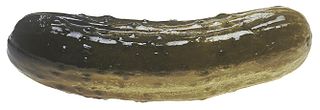
A pickled cucumber – commonly known as a pickle in the United States and Canada and traditionally a gherkin in Britain, Ireland, South Africa, Australia, and New Zealand – is a usually small or miniature cucumber that has been pickled in a brine, vinegar, or other solution and left to ferment. The fermentation process is executed either by immersing the cucumbers in an acidic solution or through souring by lacto-fermentation. Pickled cucumbers are often part of mixed pickles.
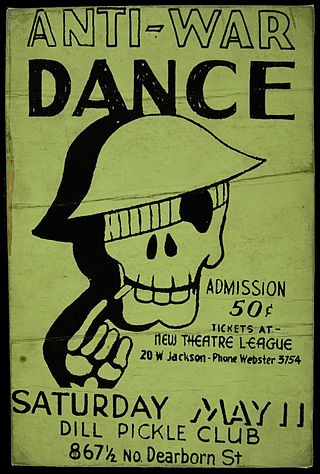
The Dil Pickle Club or Dill Pickle Club was once a popular Bohemian club in Chicago, Illinois between 1917 and 1935. The Dil Pickle was known as a speakeasy, cabaret and theatre and was influential during the "Chicago Renaissance" as it allowed a forum for free thinkers. It was founded and owned by Wobbly John "Jack" Jones and was frequented by popular American authors, activists and speakers.
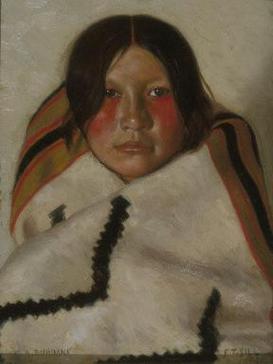
The D’Arcy McNickle Center for American Indian and Indigenous Studies is a research center within the Newberry Library in Chicago, Illinois.
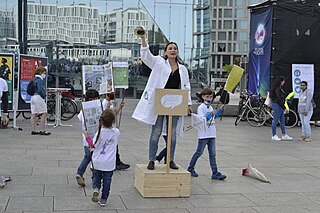
Soapbox Science is a public outreach platform that promotes women working in science and the research that they do. The events turns public spaces into an area for learning and debate, in the spirit of Hyde Park's Speakers' Corner. Soapbox Science encourages scientists to explain their research to members of the public using non-traditional methods. Speakers typically make props at home to explain the processes behind their research.
